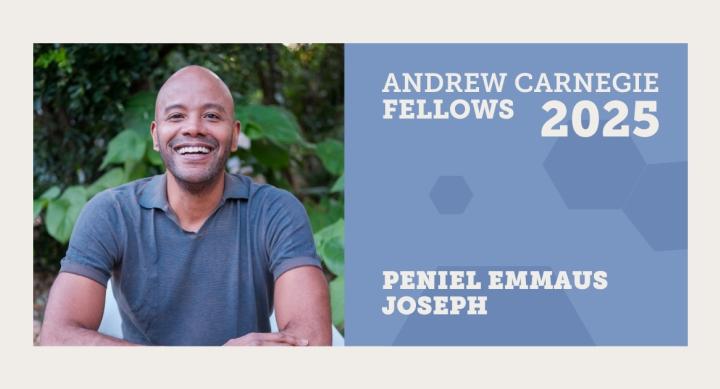
The Carnegie Corporation of New York has announced that Peniel Joseph, LBJ School professor of public affairs, Barbara Jordan Chair in Ethics and Political Values and founding director of the Center for the Study of Race and Democracy, is a member of the 2025 Class of Andrew Carnegie Fellows. Joseph is among a distinguished group of scholars chosen to receive a $200,000 stipend to support research focused on understanding and addressing political polarization in the United States.
Joseph’s project, The Fire This Time: James Baldwin’s 1963 and America’s Civil Rights Revolution, will examine the roots of polarization through the lens of history, civil rights and race, building on Baldwin’s legacy to explore the cultural and political fault lines that continue to shape American democracy today.
Under the leadership of Carnegie president Dame Louise Richardson, the 2025 class marks the second year of the Andrew Carnegie Fellows Program’s focus on building a body of research focused on political polarization. Carnegie will commit up to $18 million to this effort over the three-year period.
The winning proposals approach polarization through a wide array of disciplines and methods. Projects include analyzing the causes of the increasing political divides between men and women; assessing where Americans find common ground when it comes to their health; and understanding how partisan media, consultants and tabloid entertainment industries are driving polarization for short-term profits, among other areas of research.
“Through these fellowships Carnegie is harnessing the unrivaled brainpower of our universities to help us to understand how our society has become so polarized,” said Richardson. “Our future grantmaking will be informed by what we learn from these scholars as we seek to mitigate the pernicious effects of political polarization.”
As part of a competitive nomination process, more than 650 individuals — including the heads of universities, independent research institutes, professional societies, think tanks, major university presses and leading publications — were invited to recommend scholars for consideration. All applications underwent a preliminary anonymous evaluation by leading authorities in the relevant fields of study. The highest-scoring proposals were then forwarded to the jury.
Founded in 2015, the Andrew Carnegie Fellows Program provides the most generous stipend of its kind for research in the humanities and social sciences. To date, Carnegie has named almost 300 fellows, representing a philanthropic investment of more than $59 million. The award is for a period of up to two years and the anticipated result is generally a book or major study. Congressional testimony by past fellows has addressed topics such as social media and privacy protections, transnational crime, governmental responses to pandemics and college affordability. Fellows have received honors, including the Nobel Prize and a National Book Award.
The Andrew Carnegie Fellows Program is a continuation of the mission of Carnegie Corporation of New York, established by Andrew Carnegie in 1911, to promote the advancement and diffusion of knowledge and understanding. Today the foundation works to reduce political polarization through philanthropic support for the issues that our founder considered most important: education, democracy and peace.
Read more about the Andrew Carnegie Fellows Program, the work of past honorees, the criteria for proposals, and a historical timeline of scholarly research supported by Carnegie.

